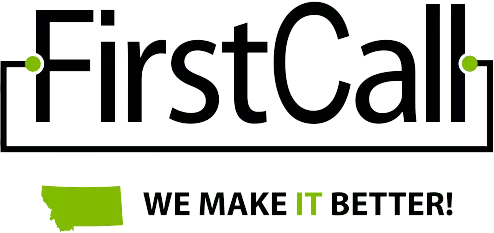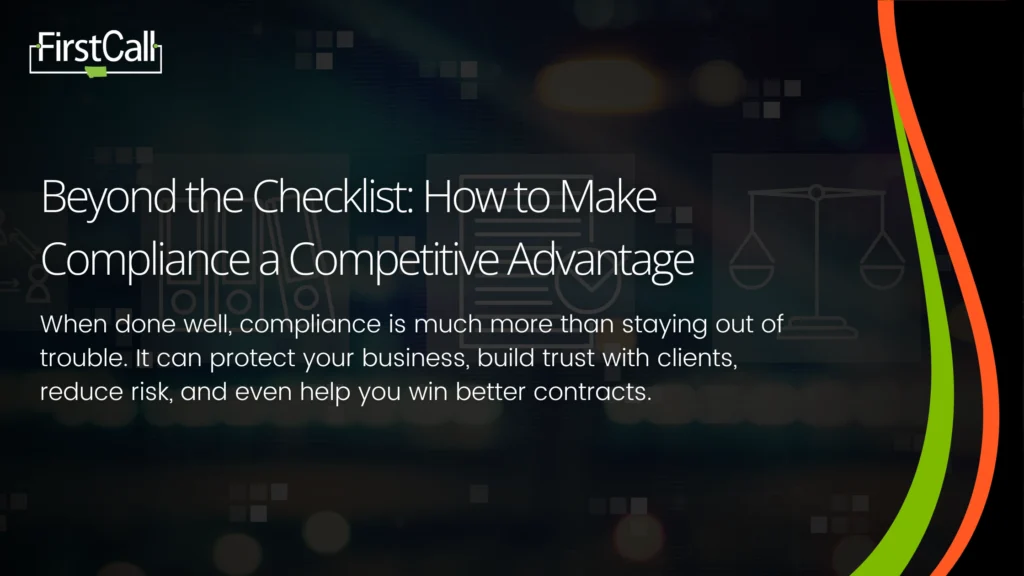Most Montana businesses don’t think of compliance as a competitive edge. It’s more often seen as a necessary burden. A list of boxes to check. A security measure you hope will pass inspection if an auditor comes knocking.
And sure, that mindset can keep you out of trouble. But it won’t help you grow.
The reality is, compliance done right can do far more than protect you from fines or failed audits. It can build trust with your clients. It can open doors to better contracts. It can help you qualify for insurance coverage. And it can give you the peace of mind that comes with knowing you’re covered where it matters most.
At First Call, we work with businesses across Montana who are tired of just scraping by on compliance. They want to feel confident in their systems, clear about their risks, and ready to grow without hesitation. This post is for those teams, the ones looking to move beyond the checklist and make compliance a real business advantage.
Why Compliance Feels Like a Chore
Let’s face it. The world of compliance isn’t exactly a page-turner.
Between HIPAA, PCI, NIST, CMMC, and SOC 2, it’s easy to get lost in a sea of acronyms and technical documents. Add in cyber insurance requirements, shifting client expectations, and fast-moving regulations, and you’ve got a setup that overwhelms even the most capable teams.
That’s why many organizations adopt a patchwork approach. You do what’s needed to get through a renewal or respond to a request. Maybe you grab a policy template online or call your IT provider for quick advice. It feels like progress in the moment, but over time, gaps start to grow.
What gets lost in the shuffle is the purpose behind compliance. It’s not about paperwork. It’s about protecting your people, your systems, and your reputation. It’s about trust.
And that’s not something you want to leave to chance.
What Audit Readiness Really Means
Audit readiness isn’t about being perfect. It’s about being prepared and being able to prove it.
Can you show that your business has the right controls in place? Can you demonstrate that policies exist, and are actually followed? Can you respond clearly and confidently if a client or regulator asks how your data is secured?
If you can answer yes to those questions, you’re not just audit ready. You’re business ready.
Being in this position tells your clients that you’re serious about your work. It tells insurers and regulators that you’re reliable. And it gives your team a roadmap to make better decisions every day.
Common Misconceptions About Compliance
We hear a lot of assumptions from good people who are simply trying to keep up. Here are a few of the most common ones that get businesses into trouble:
“We’re too small to be audited.”
Compliance is about more than regulatory audits. Even small companies can be asked to prove their security posture by insurance carriers, clients, or partners.
“We haven’t had a breach, so we must be doing fine.”
Past performance doesn’t guarantee future protection. Gaps might not show up until it’s too late.
“That’s our IT provider’s job.”
IT plays a key role, but compliance is broader. It involves your people, your policies, and your processes — not just your tools.
“We downloaded a policy template. We’re covered.”
Templates can help, but if they’re not tailored to your business or followed by your team, they’re just documents on a shelf.
Clearing up these misconceptions is one of the first steps toward building a compliance program that actually works.
The Cost of Compliance Gaps
Let’s look at what can go wrong when compliance is reactive instead of proactive.
In Montana alone, we’ve seen businesses struggle with:
- Cyber insurance denials after failing to meet baseline security standards
- Lost deals because they couldn’t demonstrate security or compliance to a client
- Delayed sales cycles due to unanswered security questionnaires
- Internal confusion about onboarding, offboarding, or acceptable use policies
None of these happen because people are lazy or careless. They happen because no one had the full picture, or the time to chase it down.
That’s why First Call takes a clarity-first approach. We help you figure out what you already have, what you’re missing, and what really matters for your business goals.
How Compliance Builds Trust
Imagine you’re up for a new contract and the client asks for your security documentation. You send over clear, professional policies that reflect real practices. That sends a message.
Or your cyber insurer requests proof of MFA, backup strategies, and endpoint protection. You’ve already got it covered, and the renewal moves forward without delay.
These aren’t just technical wins. They’re business wins. They show your team is prepared, dependable, and credible.
In today’s market, trust isn’t optional. It’s a competitive advantage.
Making Compliance Work for You
So how do you make compliance something that supports your business instead of slowing it down?
Here’s how we help clients shift their mindset:
1. Start with a Baseline Assessment
You don’t need to guess. A simple review of your risk areas, policy status, and technical controls gives you a clear view of where things stand today. Think of it like a health check for your operations.
2. Document What You Already Do
Most teams are doing a lot of things right. The problem is, none of it is documented. When you put your practices into clear, accessible policies, it becomes easier to prove compliance and align your team.
3. Prioritize What Matters
Not every compliance task has equal weight. Focus on the areas that have the most impact — things like multi-factor authentication, access control, user training, and offboarding.
4. Make It a Team Effort
If policies sit in a binder no one reads, they’re not doing their job. Build buy-in by making policies relevant and understandable for everyone on your team.
5. Set a Schedule to Review
Compliance isn’t static. Build short, regular reviews into your rhythm. It doesn’t have to be formal, even a 30-minute annual policy check-in can go a long way.
A Montana Approach to Compliance
We understand that Montana businesses don’t always have big compliance departments or full-time security staff. You’ve got lean teams, tight budgets, and real-world constraints.
That’s why we approach compliance the way Montanans approach business; straightforward, relationship-driven, and built for the long haul.
At First Call, we don’t drop a binder on your desk and walk away. We listen. We get to know your team. We explain things clearly. And we tailor our support so it fits your business, not someone else’s checklist.
We’re not here to scare you. We’re here to help you make smarter decisions, reduce stress, and show the world you’re doing things right.
Let’s Talk About Where You Stand
If you’re not sure whether your business is audit ready, you’re not alone. Most teams are closer than they think, they just need a little help connecting the dots.
Let’s talk. No scare tactics. No jargon. Just a conversation about where you are, where you want to go, and how we can help you get there.
Talk to someone on our team today. We’re happy to help.






